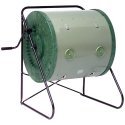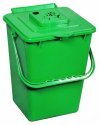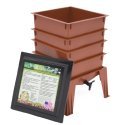Psychrophilic bacteria like to decompose compost at low temperatures.
They are most effective at 13°C (55°F). They can keep at it until the temperature reaches 20 below on the Celsius scale or zero on the Fahrenheit scale.
When researching these creatures it is important to know that some experts with useful information have formed a habit of taking a popular name for the type that do well at lower temperatures and blanketly calling all the creatures that aren’t dormant at those low temperature by the popular term.
To avoid what is surely a senior researchers pet peeve, here are the correctly defined terms:
1. Psychrotolerant and psychrotrophic is the name of a minority of organisms that live outside the rule the next two definitions set in stone. These bacteria have a different kind of physical existence. They can be referred to as mesophilic organisms.
2. Psychrotrophic bacteria are the truly cold loving bacteria whom exist at these low low temperatures.
3. The creatures that exist mainly at higher temperature but can manage to still be eeking out reproduction at low temperatures are called facultative psychrophiles and psychrophiles.
With language use the rule is always function over form. So what’s in vogue for this highly specific kind of research has to go through what linguists call “language maintenance”, shift, and death. If you gain anything from this article it will be the correct terminology so that the slang that could develop over time will make sense.
As winter sets in, it will be these bacteria hard at play like the dolphins and the bees referred to by Jacque Custo, turning the collected home refuse into useful compost. This is also reason to compost inside in the cool of the basement or garage.





